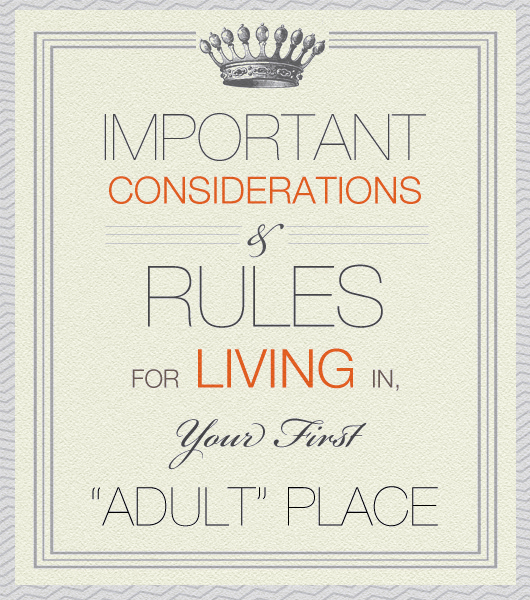No matter how prepared you might be, moving out on your own for the first time can be a frustrating and frightening experience. Chances are that getting a roommate will have crossed your mind at some point, and frankly it’s probably one of the best moves you can make in your early 20s. The benefit of splitting rent and bills itself should make the prospect tempting enough, to say nothing of the added security and companionship. There’s even an easy way to avoid the horror stories and general hassle of connecting with a total stranger since your roommate will probably be an old buddy, possibly from high school but more likely from college. After all, you’ve lived together for the past few years, why not go a couple more?
Before you put anything down on paper, however, there are a few things you’ll need to keep in mind.
I. Don’t Try to Recreate College Life
Getting the gang back together is an exciting prospect whether you’re moving in together right after graduation or reconnecting after you’ve both been out of school for a few years. After all, you’re resurrecting the good old days, full of pranks, debates, movie marathons, parties, and commiseration over the lousy cafeteria food.
The problem is, that’s not what college was.
Looking back, we tend to only remember the good times. All the little stresses, frictions, annoyances, heck, even the full-blown fights get pushed out of the picture. It’s easy for us to focus on the fun and freedom, and when real life doesn’t match up, we get frustrated. Or even if your college days really were nothing but a 4-year streak of awesomeness, this isn’t college. What worked then isn’t necessarily going to work now. Staying up into the early hours of the morning is one thing when we’re taking a blow-off elective. It’s entirely different when we have to be up at the crack of dawn to get to our jobs.
Don’t get me wrong – none of this is to say that you can’t (or won’t) have a good time. You can and will; but only so long as you’re creating them in the here and now.
II. House Rules Are Vital
“Whoa,” you might be saying, “House rules? Me and my friend are chill, laid-back guys. We’re not going to need rules.”
Oh how wrong you’d be.
In the honeymoon stage (yes, there is a honeymoon stage and yes, I wish I didn’t have to call it that) it’s easy to ignore the idea of conflict, much less the need for a set of rules. While I’m not talking about putting each and every decision through a congressional subcommittee, there does need to be some common ground. At the very least, a consensus that either of you can refer to if (okay, when) the need arises. Utilities usage, having guests (both romantic and otherwise) over, cleanliness, noise, these things need to be addressed as early as possible. You might be tempted to take a fly-by-the-seat-of-your-pants approach and settle conflicts if and when they arise, but that just isn’t going to work – at least, not very well or for very long.
Say that your roommate’s leaving dishes in the sink for days on end. You think it’s stinking up the house and attracting bugs, so you figure “Hey, I’ll just ask him to wash ‘em within 24 hours.” To your surprise, he argues that it’s really no big deal and that you’re getting bent out of shape over nothing. Next thing you know, the argument’s spiraled out of control and you’re in a passive-aggressive standoff that’d put the Cold War to shame, with neither of you willing to budge or able to win. Again, that’s where rules come into play: They might not stop arguments, but they can keep them from stagnating until they turn into something worse.
Better to have ‘em and not need ‘em than need ‘em and not have ‘em.
III. There’s No Bond So Strong That Money Can’t Break It
That’s not to be cynical, that’s just a hard fact of life. Bills need to be paid. Food needs to be bought. Rent’s due on the first of the month, and no brotherly bond is going to change that. Having a roommate is, at the end of the day, as much a financial agreement as a social contract, and heck, one of the biggest reasons you even have a roommate is because money’s tight (as it is for most folks in their early 20s). There’s nothing wrong with being strict when it comes to this stuff, I’d go so far as to say it’s your obligation as an adult.
Your roommate being late on getting his half of the utilities to you might very well result in you being late on one of your bills, and you’d better believe the electric company isn’t going to be half so forgiving as you are. Again, this isn’t be to a hard-ass, it’s just to exemplify why it’s so important to be on the same page financially. Create a budget, even if it’s just a rough one, and figure out a fair and reasonable system. What bills need to be paid when, or what constitutes a reasonable grace-period is for getting money together. How you’re going to work things out if either of you needs to find a new job. A little bit of number-crunching in the beginning will save you both from serious stress in the long run.
IV. It’s Less About Where You Are Now Than Where You’re Going
While money is important, you need to understand that it’s neither the only nor the greatest pitfall you might encounter. Heck, in the grand scheme of things, money problems are relatively easy to solve. Divergent life goals, on the other hand, are far less simple.
Let’s say that one roommate is comfortable coasting by flipping burgers. He doesn’t make much, but it allows him to work on his screenplays and it’s enough for him to get by and still leave some left over for beer and pizza on the weekends.
There’s nothing wrong with that.
Let’s say the other roommate is hell-bent on moving into a bigger place. Getting the kind of apartment (or even house) with an extra room for guests. Space in the garage for a home-brewing kit. A decent enough neighborhood where he doesn’t have to worry about his place being burglarized.
Nothing wrong with that either.
The early 20s are, after all, a confusing and chaotic time of life, and I’m not going to begrudge anybody finding a sense of peace or purpose. Problem is, when you and your roommate aren’t moving in the same direction there’s bound to be conflict. The first roommate is going to feel constantly pressured to live a life he doesn’t want (or want quite yet) and the second is going to feel like he’s being held back. That kind of fundamental clash can lead to frustration and resentment, and poison even the best of friendships. During the first weeks of moving in (or ideally, before), it’s important to get on the same page about where you’re both headed in life. You don’t need to compromise your goals, but you do need a clear and concrete understanding of your expectations.
V. You Need To Know When Not To Get Involved
Communication, as you’ve probably guessed by now, is half the battle here. Being on the same page about finances, career and life goals, and day-to-day expectations are all good and necessary, but there is such a thing as going too far.
When you’re living with someone, it’s hard not to get involved in their business. As involved in each other’s lives as you will inevitably be, it’s important to understand that, at the end of the day, you’re two grown adults and your responsibility is, first and foremost, to yourselves. You’re both going to need to stand on your own feet and sort out your own problems without becoming dependent on each other.
It might sound strange, but helping can often be a selfish move, more directed at benefiting yourself than your roommate. Even if you’re working with the noblest of intentions, it’s still easy to mistake who you’re really trying to help. For the sake of your friendship and for your respective development as adults, you need to set boundaries on what you will and won’t get involved in. A few games of Halo to ease the agony of a bad break-up is all fine and well, but you can’t let yourself get tangled up in something messy. Your job isn’t to be a counselor or a coach or a parent – it’s to be a roommate, pure and simple.
It’s sort of like how parents need to be parents to their kids first, and friends with them second. The same goes here: You're roommates first, old friends second. Your home is your sanctuary – you have to be able to extricate yourselves from individual drama, whether that’s career issues, family situations, personal struggles, etc. Again, that might sound callous, but it’s as much for their good as yours.
VI. It’s Not Going To Be Permanent
For better or worse, you and your roommate will one day be going your separate ways. Avoiding that train of thought might be easy, but you are going to need a game plan for that eventuality. Are you going to be financially stable enough to support yourself? If not, that has got to be addressed, and as soon as humanly possible. And while moving out isn’t going to mean severing ties with your roommate, you are going to be on your own. That sudden absence can be a shock if you’re not prepared for it, that’s got to be dealt with as well. All of the harsh realities I’ve just mentioned aside, you need to remember:
VII. It Will Be Awesome If You Make It Awesome
Deciding to live with someone means giving up privacy and even some freedom, and at a point in your life when you’re probably getting your first real taste of both. It is a trade-off, and as with so much in life, what you get out of it is what you put into it.
In spite of the balancing act that it can require (sloppiness on one side and over-regimenting on the other), getting a roommate is one of the best opportunities available right now. There’s nothing to help you transition into adult life more than having someone to struggle along with you. While dependency needs to be avoided, the general financial security a roommate can offer allows for some real exploration on your part. Whether it’s trying out a new line of work, saving money up to travel, or just developing yourself in general, a roommate gives us not only the freedom to expand our horizons but someone to keep us accountable to our goals as well. You put in the effort, you will see the rewards – it’s as simple as that.
And to my own roommate, Luke, if you’re reading this, it’s your ****ing turn to take out the trash.

















